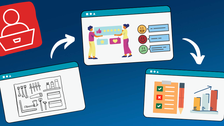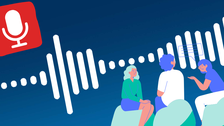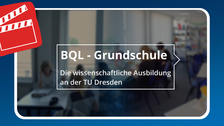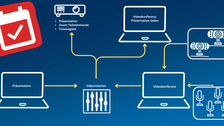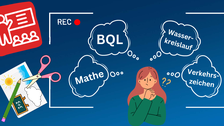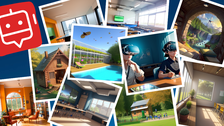The media lab at the ZLSB
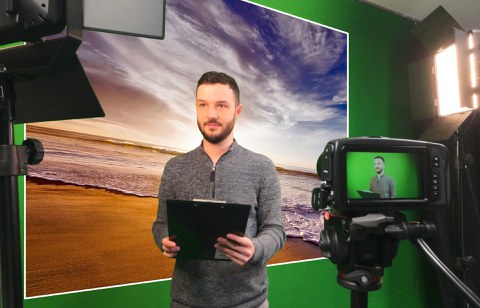
Das Medienlabor am ZLSB
The media lab at the ZLSB supports staff, lecturers, student teachers and lateral entrants in the use of video, podcast and PC technology. This includes, for example, creating and editing videos and organising lectures - either online, hybrid or as recordings. The recording of podcasts or other audio content and the use of appropriate software (including DaVinci Resolve Studio, Adobe Creative Cloud) to create and edit digital media are also possible.
The media lab and its technology are available to all members involved in teacher training and further education at TU Dresden. Student teachers and lateral entrants in further education programmes (BQL) can also use the media lab.
A precondition for using the room and its technology is usually a technical briefing or supervision and acceptance of the terms of use.
Detailed information on the terms of use can be found in the OPAL course OPAL-Kurs „Das Medienlabor am ZLSB" in the "Legal" section (in German "Rechtliches") .
The technical equipment allows a variety of scenarios to be realised. These can take place in the media lab itself. However, it is also possible to borrow equipment for external use. Technical support can also be organised on request.
The following overview lists possible scenarios in the areas of "film, audio and PC": Einsatzszenarien des Medienlabors
Customised scenarios can be considered on request. Please send an e-mail to .
The media lab offers space for up to 5 people. In addition, a conference room is available for 15 to a maximum of 20 people.
The media lab and the conference room can be used on weekdays between 9:00 and 15:30 after prior registration and confirmation.
Please send enquiries about room and/or technology use to .
Detailed information on the media lab, the terms of use and the registration process for workshops can be found in the OPAL course OPAL-Kurs „Das Medienlabor am ZLSB".
The media lab is jointly coordinated by various projects at the ZLSB:
- BQL.Digital
Dagmar Oertel, Christin Nenner and Claudia Hottas - Making Teachers Confident (MTC)
Anja Schanze and Mathis Heinig
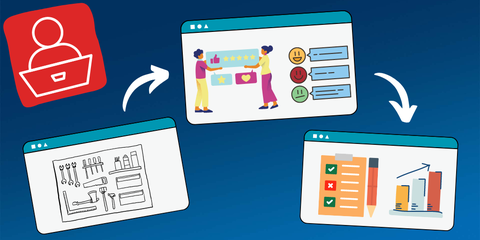
Aufnahme eines Lernmoduls zu den Umfragetools Edkimo und SIEVAS © Malte Krone
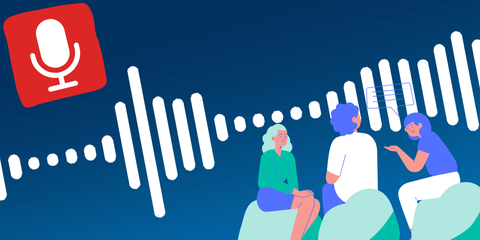
Aufnahme eines Podcasts zu Studienerfolge im Lehramt © Malte Krone
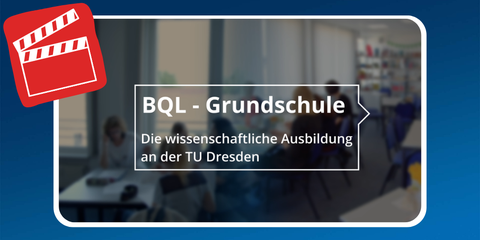
Erstellung eines Informationsfilmes zum Bereich Grundschule von BQL © Malte Krone
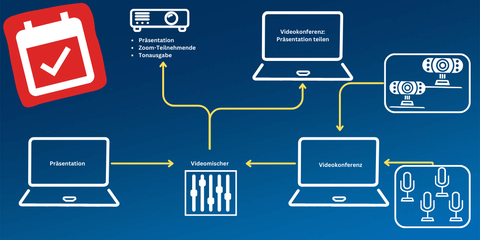
Technische Unterstützung einer hybride Veranstaltungswoche bei BQL-Grundschule © Malte Krone
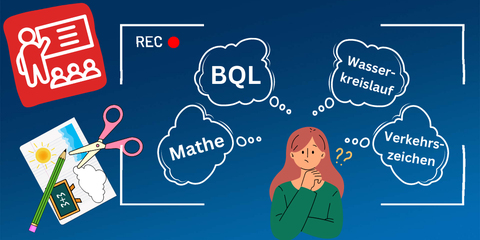
Workshop zu Erklärvideos mittels Legetechnik © Malte Krone
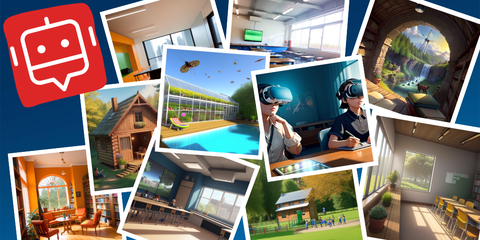
Bereitstellung einer Bildgenerierung mittels KI © Malte Krone
Since the media lab was established, numerous projects have been supported. These have been realised on site, for example during the recording of a podcast, or as part of a hybrid event week on the DIU premises.
As part of BQL.Learn, the BQL.Digital-Team produces self-learning modules: In dialogue with lecturers and experts, digital tools such as H5P, Kahoot! and Edkimo are introduced, and the use of tablets and digital boards in lessons is also discussed. Each learning module offers videos on individual areas of a topic, link tips and quizzes to test your own knowledge.
The video and recording technology of the media lab was used for the Edkimo and SIEVAS - Feedback and Evaluation of Lessons learning module.
To the self-learning modules: https://tud.link/pxvr
To the video "Introduction & use of Edkimo": https://tud.link/gt4k
The Edkimo and SIEVAS learning module was technically implemented by Arian Richter (student assistant) and Malte Krone (BQL.Digital).
The ZLSB podcast series gives prospective applicants, university students and employees of TU Dresden an insight into the tasks of the various areas of the central institution and provides information on various topics. The interviews with various stakeholders are constantly being expanded.
The 16th episode "MTC@TUD - Studienerfolg im Lehramt" was recorded as part of the introduction of podcast technology in the media lab.
To the podcast series of the ZLSB https://tu-dresden.de/zlsb/publikationen/podcast
The podcasts were realised by Mathis Heinig and Anja Schanze (both MTC project).
The primary school section (Bereich Grundschule) of the in-service teacher training programme (BQL) introduces itself in its own image film. In addition to impressions from the BQL primary school subjects, the film also describes the organisational aspects.
Lecturers were interviewed in the media lab to make the film. The film was shot in front of a green screen, which made it possible to change the background image in post-production. The moving shots at DIU were realised with a gimbal mount for the camera. Wireless microphones and PC technology were also used to edit the film.
About the film: https://tud.link/g7dg
The film was produced by Malte Krone (BQL.Digital).
The primary school section (Bereich Grundschule) of the in-service teacher training programme (BQL) held the hybrid event "Hybride Werkstatt-Tage" with the support of the media lab.
The challenge here was to simultaneously display presentations for the participants on site and for those who joined digitally. At the same time, the online participants had to be visible on a screen for the people on site during workshop and feedback sessions.
Several webcams, wireless microphones and a video mixing unit were used to transmit the video images via zoom, projector and presentations.
To the news article about the event: https://tud.link/9u2r
The event was technically supported by Malte Krone (BQL.Digital).
As part of the in-service qualification for teachers (BQL), the use and realisation of explanatory videos was tested in seminars and workshops. Participants had the opportunity to create their own explanatory videos using the cutout animation technique. Special trick film boxes were built for this purpose, with which small paper graphics and ideas can be quickly and easily filmed and produced as explanatory videos using a smartphone or tablet.
To the news article on the explainer video workshops: https://tud.link/rhbu
First attempts at presentation videos for the BQL project: https://tud.link/z45p
The seminars and workshops were supported by Dagmar Oertel, Robert Päßler and Malte Krone (BQL.Digital).
As part of the second "Teachermania" on 8 June 2023, organised by the MTC project (Projekt MTC), stakeholders from the BQL primary school sector (BQL-Grundschule) held a future workshop on the topic of "The future of school". Interested parties were able to inform themselves, exchange ideas and experiment at individual stations on the three phases of criticism, utopia and realisation.
As part of the future workshop, participants were able to visualise their ideas and visions of the school of the future using AI and the Stable Diffusion application. Under guidance and with the help of PC technology from the media lab, the AI created images based on the participants' own descriptions, which were projected into the room using a projector.
To the slideshow video: https://tud.link/hpsf
The image generation was supervised by Malte Krone (BQL.Digital).
Contact us
You are welcome to contact us at . Ms Dagmar Oertel and Ms Christin Nenner from BQL.Digital will be available to answer your questions about the media lab.
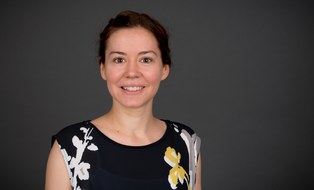 © Kirsten Lassig
© Kirsten Lassig
Research associate
NameMs Dipl.-Medieninf. Dagmar Oertel
BQL.Digital
Send encrypted email via the SecureMail portal (for TUD external users only).
Center for Teacher Education and Educational Research (German abbreviation: ZLSB)
Center for Teacher Education and Educational Research (German abbreviation: ZLSB)
Visiting address:
Seminargebäude II, Room 201 Zellescher Weg 20
01217 Dresden
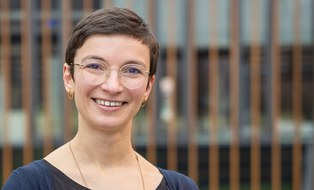 © Steffen Schreiber
© Steffen Schreiber
Research associate
NameMs Dr. Christin Nenner
BQL.Digital
Send encrypted email via the SecureMail portal (for TUD external users only).
Center for Teacher Education and Educational Research (German abbreviation: ZLSB)
Center for Teacher Education and Educational Research (German abbreviation: ZLSB)
Visiting address:
Seminargebäude II, Room 201 Zellescher Weg 20
01217 Dresden

